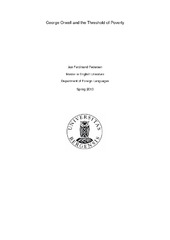| dc.description.abstract | This thesis seeks to explore the complexity in Orwell's depicition of poverty, namely in /Keep the Aspidistra Flying/, /A Clergyman's Daughter/, /Down and Out in Paris and London/, as well as in the essays 'How the Poor Die' and 'Common Lodging Houses'. The thesis applied Giorgio Agamben's thoughts on the 'homo sacer' (sacred man) and the notion of the threshold to see how the poor are torn between an animalistic and a human existence, living as outlaws but still subject to the law; lawless but still citizens. It also applies Walter Benjamin's thoughts on the capitalism of the 1930s, to examine the economic mentality of that decade, and to understand the social exclusion of the poor and their failure to participate in a mutualism towards a healthier economy. | en_US |
